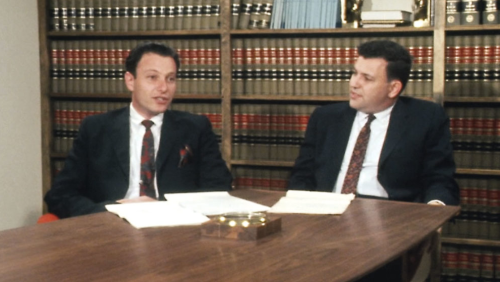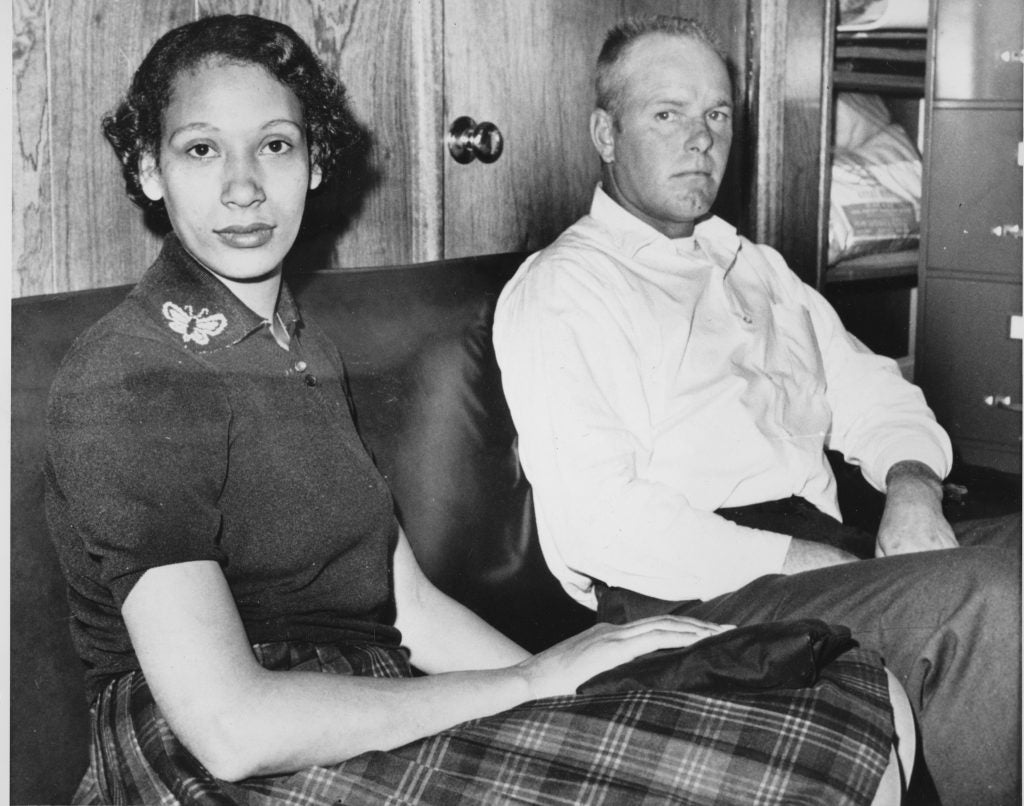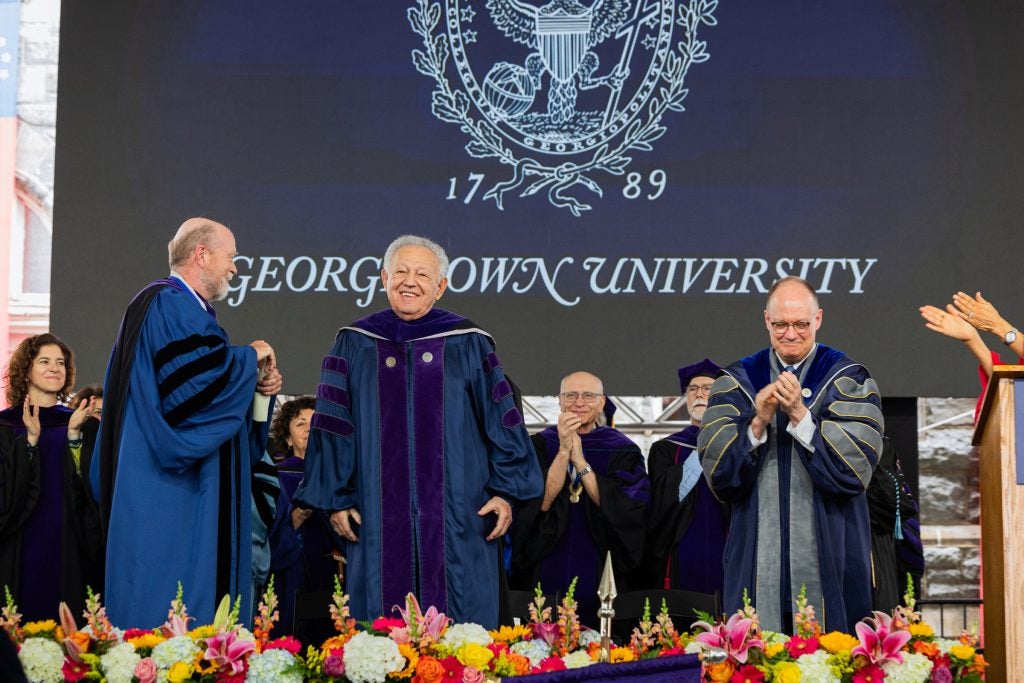Georgetown University to Present Honorary Doctorate to Civil Rights Attorney Philip Hirschkop, L’64
May 14, 2024

Georgetown Law alumni Bernard Cohen, left, and Philip Hirschkop, right, represented Mildred and Richard Loving in the landmark case that led to the legalization of interracial marriage in the U.S. Photo from a 1967 ABC News interview, courtesy of the 2011 documentary "The Loving Story."
Philip Hirschkop, L’64, will receive an honorary Doctor of Laws degree at the Georgetown Law commencement on Sunday, May 19. In the six decades since his graduation, Hirschkop has had a storied career in civil rights law, but he is best known for one of his first cases: partnering with fellow Georgetown Law alumnus Bernard Cohen, L’61, to represent Mildred and Richard Loving, an interracial couple whose quest to be allowed to live as husband and wife in their home state of Virginia led to a landmark Supreme Court decision legalizing interracial marriage. This excerpt from a 2017 Georgetown Law Magazine story by Jessica Kraft tells the story of how Hirschkop’s student activism led him to join the Lovings’ case, and other ways in which the Law Center supported the case’s development.
Philip Hirschkop vividly recalls the moment that launched his career as a civil rights trailblazer. It was a hot July day in 1964, and Hirschkop, a recent Georgetown Law graduate, and Chester Antieau, who’d been his first-year Constitutional Law professor, had settled into two leather chairs in Georgetown Law’s faculty lounge when a secretary slipped Antieau a note from another one of his former students. Bernard Cohen was waiting outside to speak to him about a case the American Civil Liberties Union (ACLU) of the National Capital Area had asked him to investigate – the case of Mildred and Richard Loving, an interracial couple who had been banished from Virginia for 25 years due to the state’s anti-miscegenation law.
After Antieau summoned Cohen into the lounge, the three chatted for about 20 minutes before Antieau recommended that Cohen partner with Hirschkop, who had experience in civil rights litigation. “Professor Antieau said to [Cohen] that I was one of his brightest students, which wasn’t true,” Hirschkop said, laughing. “I was deeply involved in civil rights in those days, and he thought maybe I could be of help.”
Antieau’s instincts were sound. Loving v. Virginia eventually reached the Supreme Court, resulting in a major civil rights victory. Georgetown Law alumni were at the forefront of this historic case, with students providing research and support at the time.
“Today, the Loving decision has a fan base…[it] has been chronicled in films, and the decision has its own annual worldwide celebration, Loving Day, on June 12… Loving was also a progenitor of the Supreme Court’s 2015 decision Obergefell v. Hodges, which constitutionalized same-sex marriage,” Professor Sheryll Cashin notes in her 2017 book “Loving: Interracial Intimacy in America and the Threat to White Supremacy.”
Living and Loving in Exile
When the Lovings traveled to Washington, D.C. in 1958 to marry and returned to Caroline County, Virginia as newlyweds, they were unaware that they were committing a crime. A month after their marriage, the Lovings awoke in the middle of the night to see all three of Caroline County’s law enforcement officers standing over them.
The Lovings pleaded guilty to cohabiting as spouses and were sentenced to one year in prison. The trial judge, Leon M. Bazile, suspended the sentence under the condition that they leave Virginia for 25 years. The couple consequently moved to Washington, D.C., but as the years passed, they couldn’t adapt to city life. Mildred’s cousin suggested that she write to Attorney General Robert F. Kennedy, who in turn referred her to the ACLU.

Mildred and Richard Loving in 1965 (AP Photo)
The Legal Battle
In November 1963, Cohen filed a petition to vacate the judgment against the Lovings. The court did not issue a ruling, and the case faded into the background. By the summer of 1964, the Lovings had returned to Virginia in violation of their sentences. On July 2, Congress passed the Civil Rights Act of 1964. A few days later, Mildred wrote to Cohen seeking an update on their case. It was this letter that brought Cohen to Georgetown Law to talk the matter over with Professor Antieau, launching the collaboration between Cohen and Hirschkop.
The case would be a turning point in Hirschkop’s career as a civil rights activist. A year before, Hirschkop had met several civil rights attorneys who inspired him and three other students from different schools to found a Law Students Civil Rights Research Council. Among the organization’s activities was mobilizing voters’ rights efforts in the South. Shortly after passing the bar exam in May 1964, Hirschkop filed a case on behalf of teachers’ rights to engage in social justice activities. This background — and lifelong passion for social justice — helped prepare him for Loving.
Antieau continued to assist Hirschkop and Cohen as a mentor. The Georgetown chapter of the Law Students Civil Rights Research Council would prove invaluable, researching laws in different states as the attorneys began their work on the case. “The students in that chapter were very helpful in the research for the Loving case,” Hirschkop says. “To this day, I feel very close to Georgetown.”
In October 1964, Hirschkop and Cohen filed a federal lawsuit challenging the constitutionality of Virginia’s anti-miscegenation laws. The case ultimately made its way to the U.S. Supreme Court, and on June 12, 1967, the Supreme Court unanimously struck down laws banning interracial marriage, which was prohibited in 16 states. “The freedom to marry has long been recognized as one of the vital personal rights essential to the orderly pursuit of happiness by free men,” Chief Justice Earl Warren wrote in the opinion.

On May 19, 2024, Hirschkop received a standing ovation during the Georgetown Law commencement ceremony when presented with an honorary doctorate. L-R: Georgetown Law Dean William M. Treanor, Hirschkopf, Georgetown University President John J. DeGioia, with members of the Georgetown Law faculty behind them. Photo: Elman Studio
The Legacy of Loving
Mildred and Richard Loving spent the rest of their lives in their hometown, Central Point, Virginia. Richard died in a car crash in 1975 at the age of 41, while Mildred lived until 2008. At the time of her death, she had three children, eight grandchildren and 11 great-grandchildren.
Cohen went on to join the Virginia House of Delegates, where he served for 15 years. He died in 2020. Hirschkop taught Constitutional Litigation at Georgetown Law, calling the experience “some of the most rewarding efforts of my legal career.” He also opened his own law practice and continued to take civil rights and personal injury clients, handling important cases in animal rights, women’s access to education, antiwar demonstration and more.
He believes that the most significant impact of the Loving case is that it established the sanctity of marriage in the eyes of the law. “It’s not just social experience. It’s so important it’s protected by the Constitution. And the government doesn’t have the right to come past the front door of your house or into your bedroom and tell you who your partner can be,” he said. “It’s a major precedent for same-sex marriages. The sanctity of two people who unite to spend their lives together whether they go get a marriage certificate or make it a common law commitment, is something that the government … according to Loving, has to respect.”